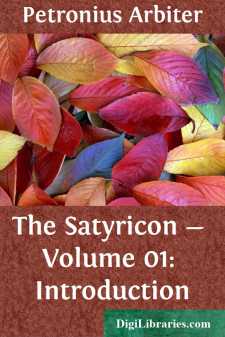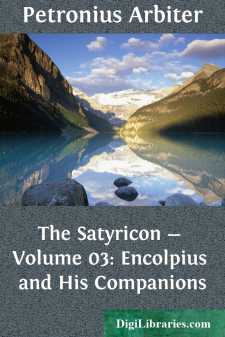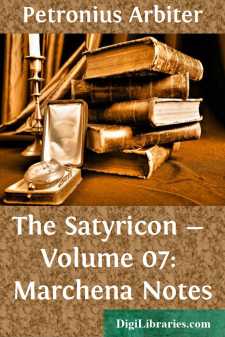Categories
- Antiques & Collectibles 13
- Architecture 36
- Art 48
- Bibles 22
- Biography & Autobiography 813
- Body, Mind & Spirit 142
- Business & Economics 28
- Children's Books 16
- Children's Fiction 13
- Computers 4
- Cooking 94
- Crafts & Hobbies 4
- Drama 346
- Education 46
- Family & Relationships 57
- Fiction 11829
- Games 19
- Gardening 17
- Health & Fitness 34
- History 1377
- House & Home 1
- Humor 147
- Juvenile Fiction 1873
- Juvenile Nonfiction 202
- Language Arts & Disciplines 88
- Law 16
- Literary Collections 686
- Literary Criticism 179
- Mathematics 13
- Medical 41
- Music 40
- Nature 179
- Non-Classifiable 1768
- Performing Arts 7
- Periodicals 1453
- Philosophy 64
- Photography 2
- Poetry 896
- Political Science 203
- Psychology 42
- Reference 154
- Religion 513
- Science 126
- Self-Help 84
- Social Science 81
- Sports & Recreation 34
- Study Aids 3
- Technology & Engineering 59
- Transportation 23
- Travel 463
- True Crime 29
The Satyricon - Volume 01: Introduction
Description:
Excerpt
PREFACE
Among the difficulties which beset the path of the conscientious translator, a sense of his own unworthiness must ever take precedence; but another, scarcely less disconcerting, is the likelihood of misunderstanding some allusion which was perfectly familiar to the author and his public, but which, by reason of its purely local significance, is obscure and subject to the misinterpretation and emendation of a later generation.
A translation worthy of the name is as much the product of a literary epoch as it is of the brain and labor of a scholar; and Melmouth's version of the letters of Pliny the Younger, made, as it was, at a period when the art of English letter writing had attained its highest excellence, may well be the despair of our twentieth century apostles of specialization. Who, today, could imbue a translation of the Golden Ass with the exquisite flavor of William Adlington's unscholarly version of that masterpiece? Who could rival Arthur Golding's rendering of the Metamorphoses of Ovid, or Francis Hicke's masterly rendering of Lucian's True History? But eternal life means endless change and in nothing is this truth more strikingly manifest than in the growth and decadence of living languages and in the translation of dead tongues into the ever changing tissue of the living. Were it not for this, no translation worthy of the name would ever stand in need of revision, except in instances where the discovery and collation of fresh manuscripts had improved the text. In the case of an author whose characters speak in the argot proper to their surroundings, the necessity for revision is even more imperative; the change in the cultured speech of a language is a process that requires years to become pronounced, the evolution of slang is rapid and its usage ephemeral. For example Stephen Gaselee, in his bibliography of Petronius, calls attention to Harry Thurston Peck's rendering of "bell um pomum" by "he's a daisy," and remarks, appropriately enough, "that this was well enough for 1898; but we would now be more inclined to render it 'he's a peach.'" Again, Peck renders "illud erat vivere" by "that was life," but, in the words of our lyric American jazz, we would be more inclined to render it "that was the life." "But," as Professor Gaselee has said, "no rendering of this part of the Satyricon can be final, it must always be in the slang of the hour."
"Some," writes the immortal translator of Rabelais, in his preface, "have deservedly gained esteem by translating; yet not many condescend to translate but such as cannot invent; though to do the first well, requires often as much genius as to do the latter. I wish, reader, thou mayest be as willing to do the author justice, as I have strove to do him right."
Many scholars have lamented the failure of Justus Lipsius to comment upon Petronius or edit an edition of the Satyricon. Had he done so, he might have gone far toward piercing the veil of darkness which enshrouds the authorship of the work and the very age in which the composer flourished....









